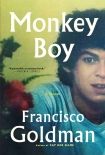Monkey Boy, Francisco Goldman [best story books to read .txt] 📗

- Author: Francisco Goldman
Book online «Monkey Boy, Francisco Goldman [best story books to read .txt] 📗». Author Francisco Goldman
Did the United Fruit bilingual secretary, Lolita Ojito, ever filch a note or diary page in which Freud’s nephew had scribbled something like “if this is gonna work, boys, we gotta get that archbishop on board, and pronto” and bring it to her best friend in Our Lady’s Guild House, so that she could give it to the consul, who would pass it directly to President Árbenz, maybe in time to save the day? Doesn’t seem so. At any rate, the day was never saved. Questioning Mamita about the coup has turned out to be pretty futile. If only I’d thought to ask her about it years ago. If only.
Mamita, that consul you worked for, I ask, what was his name? She confidently answers, I don’t remember, Frankie. She never remembers that guy’s name. The Guatemalan consulate was located at 72 Liberty Street, an old office building no longer standing, I found the address on my last overnight visit when I spent the morning in the Boston Public Library scrolling through blurry microfilm of 1950s Boston telephone books with a librarian-lent magnifying glass held to the smudgy columns of print on the screen. It took hours to find. I ended up having to hobble-run to Back Bay Station to catch my train back to New York and didn’t have time to stop into the Italian deli to get the submarine sandwich I’d been thinking about all morning. But at least now I can say, Seventy-Two Liberty Street, that’s where you worked. Does that ring a bell, Ma?
While my mother gazes sleepily at the Scrabble board, I pull out my phone. Lulú hasn’t answered my message about children and windows. Might it have gone missing? Should I resend it? No, better wait.
Mami, I say, I know the consul was allowed to run his own business out of the consulate. He imported shoes from Italy, didn’t he?
As if she had this answer ready and was just waiting to give it, my mother says, No, not shoes, Frankie. Heels and soles.
Tacones y suelas in Spanish, such pretty words, it could be a song title. The consul only imported tacones y suelas, Ma?
Yes, she says, in one room at the consulate, he kept cardboard boxes full of tacones y suelas.
Whenever we talk about her years at the consulate, my mother never alludes to the coup, yet she never fails to mention that room and the cardboard boxes packed with heels and soles. What is it about that room that keeps it so present in her memory when so much else has faded? Maybe it was the daily drudgery of filling out invoices and other forms for the importation of heels and soles from Italy and their shipment to shoe factories and cobblers elsewhere in the United States that imprinted an inky stamp in her memory. When I’m very old and someone says pelícano and I brighten with recognition, will I remember why I do?
On the Scrabble board I’ve just spelled out “chumpa,” a word only used in Central America. Do you remember what a chumpa is, Ma? I ask.
A jacket, she answers with a note of resentment, as if she’s thinking: You think I’m so far gone that I don’t remember what a chumpa is?
Can you make a word with an a in it? Calamidád? Calambre? Cat?
No, no puedo, she says.
How about the p? Chompipe.
With quivering gnarled hand she slowly slides the a under the p.
See? You can do it, Mamita. “Pa” is a perfectly good word.
After the overthrow in Guatemala, didn’t Yolanda Montejo and Lolita Ojito realize what they’d been perhaps uncomprehending witnesses to? Growing up, I never heard my mother say anything that would have made me think she didn’t share her family’s politics, regarding Guatemala, I mean, though she never expressed those opinions with the usual family vehemence. The year after I was born, after she’d left my father and taken me to live with her in my abuelos’ house, Eisenhower’s veep came to show support for the postcoup dictatorship, and Mamita got to meet him—or at least see him close up—at a reception at the Club Guatemala. Ay, no, that Nixon, she’d say, recounting it years later, and she’d stick out her lower lip, crunch her eyebrows together, hunch her shoulders, and say, Que hombre más feo.
If I’m remembering right, Madame Chiang Kai Shek, who’d studied at the women’s college in the next town, was her favorite political figure. Ma, I ask, who did you admire more, Madame Chiang Kai Shek or Jackie O?
Madame Chiang Kai Shek, she says without hesitation. She warned the world about the Communists.
My expression must be a bit surprised, because she smiles as if embarrassed and lets out one of her little yelping laughs. I feel a





Comments (0)